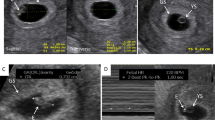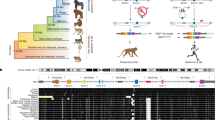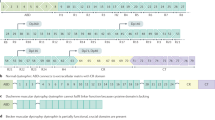Abstract
Mitchell–Riley syndrome/Martinez–Frias syndrome (MRS/MFS) is a rare, autosomal recessive disorder with multisystem involvement and poor prognosis. Most reported cases have been associated with homozygous or compound heterozygous mutations in the RFX6 gene, a transcriptional regulatory factor for pancreatic morphogenesis. Given the limited number of reported cases, the syndrome may be under-recognized. When the particular phenotype of MFS includes a mutation on the RFX6 gene and neonatal diabetes, it has been called Mitchell–Riley syndrome. Because of this, we propose that MFS/MRS is a symptom continuum or an RFX6 malformation complex. We report an infant with all of the key clinical features of MRS/MFS without a definable mutation in RFX6 gene, supporting the consideration of these features as a symptom complex, and raising the question of genetic heterogeneity.
This is a preview of subscription content, access via your institution
Access options
Subscribe to this journal
Receive 12 print issues and online access
$259.00 per year
only $21.58 per issue
Buy this article
- Purchase on Springer Link
- Instant access to full article PDF
Prices may be subject to local taxes which are calculated during checkout

Similar content being viewed by others
References
Martinez-Frias ML, Frias JL, Galan E, Domingo R, Paisan L, Blanco M . Tracheoesophageal fistula, gastrointestinal abnormalities, hypospadias, and prenatal growth deficiency. Am J Med Genet 1992; 44: 352–355.
Anneren G, Meurling S, Lilja H, Wallander J, von Dobeln U . Lethal autosomal recessive syndrome with intrauterine growth retardation, intra- and extrahepatic biliary atresia, and esophageal and duodenal atresia. Am J Med Genet 1998; 78: 306–307.
Mitchell J, Punthakee Z, Lo B, Bernard C, Chong K, Newman C et al. Neonatal diabetes, with hypoplastic pancreas, intestinal atresia and gall bladder hypoplasia: search for the aetiology of a new autosomal recessive syndrome. Diabetologia 2004; 47: 2160–2167.
Jeha GS, Venkatesh MP, Edelen RC, Kienstra KA, Karaviti L, Fernandes CJ . Neonatal diabetes mellitus: patient reports and review of current knowledge and clinical practice. J Pediatr Endocrinol Metab. 2005; 18: 1095–1102.
Chappell L, Gorman S, Campbell F, Ellard S, Rice G, Dobbie A et al. A further example of a distinctive autosomal recessive syndrome comprising neonatal diabetes mellitus, intestinal atresias and gall bladder agenesis. Am J Med Genet A 2008; 146A: 1713–1717.
Martinovici D, Ransy V, Vanden Eijnden S, Ridremont C, Pardou A, Cassart M et al. Neonatal hemochromatosis and Martinez-Frias syndrome of intestinal atresia and diabetes mellitus in a consanguineous newborn. Eur J Med Genet 2010; 53: 25–28.
Barone JV, Tillman EM, Ferry RJ Jr . Treatment of transient neonatal diabetes mellitus with subcutaneous insulin glargine in an extremely low birth weight neonate. J Pediatr Pharmacol Ther 2011; 16: 291–297.
Online Mendelian Inheritance in Man O. 2010: MIM Number 601346.
Concepcion JP, Reh CS, Daniels M, Liu X, Paz VP, Ye H et al. Neonatal diabetes, gallbladder agenesis, duodenal atresia, and intestinal malrotation caused by a novel homozygous mutation in RFX6. Pediatr Diabetes 2014; 15: 67–72.
Whitington PF . Neonatal hemochromatosis: a congenital alloimmune hepatitis. Semen Liver Dis 2007; 3: 243–250.
Spiegel R, Dobbie A, Hartman C, de Vries L, Ellard S, Shalev SA . Clinical characterization of a newly described neonatal diabetes syndrome caused by RFX6 mutations. Am J Med Genet A 2011; 155A: 2821–2825.
Aftab S, Semenec L, Chu JS, Chen N . Identification and characterization of novel human tissue-specific RFX transcription factors. BMC Evol Biol. 2008; 8: 226.
Online Mendelian Inheritance in Man O. 2010: MIM number 612659.
Smith SB, Qu HQ, Taleb N, Kishimoto NY, Scheel DW, Lu Y et al. Rfx6 directs islet formation and insulin production in mice and humans. Nature 2010; 463: 775–780.
Gentile M, Fiorente P . Esophageal, duodenal, rectoanal and biliary atresia, intestinal malrotation, malformed/hypoplastic pancreas, and hypospadias: further evidence of a new distinct syndrome. Am J Med Genet 1999; 87: 82–83.
Author information
Authors and Affiliations
Corresponding author
Ethics declarations
Competing interests
The authors declare no conflict of interest.
Rights and permissions
About this article
Cite this article
Cruz, L., Schnur, R., Post, E. et al. Clinical and genetic complexity of Mitchell–Riley/Martinez–Frias syndrome. J Perinatol 34, 948–950 (2014). https://doi.org/10.1038/jp.2014.162
Received:
Revised:
Accepted:
Published:
Issue Date:
DOI: https://doi.org/10.1038/jp.2014.162



